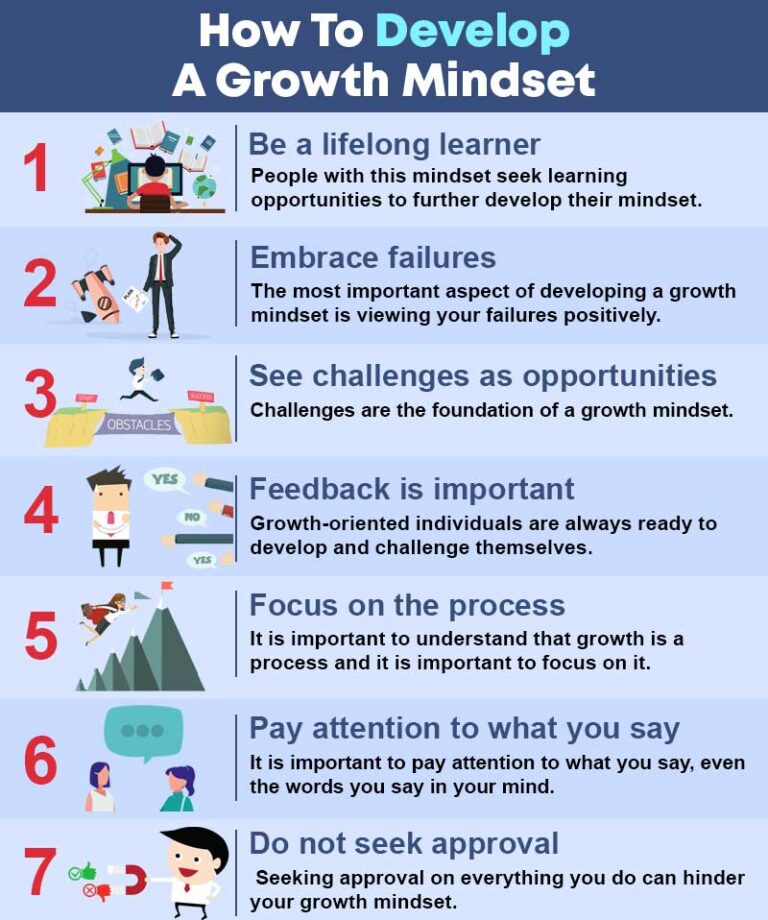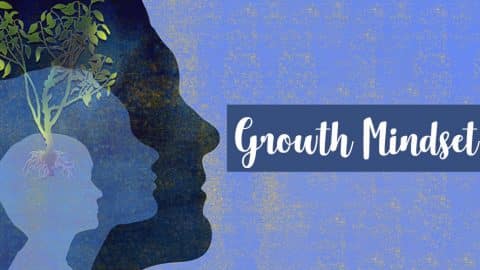A growth mindset is a powerful incentive that allows an individual to embrace failures and work towards success.
What Is A Growth Mindset?
A growth mindset is based on a positive mindset that your qualities can be cultivated through repeated efforts in order to be successful. Our mindset defines how we lead our lives. An individual with a growth mentality doesn’t view failures as obstacles but as an essential element for the road to success. A 2018 study [mfn] Ng B. (2018). The Neuroscience of Growth Mindset and Intrinsic Motivation. Brain sciences, 8(2), 20. https://doi.org/10.3390/brainsci8020020 [/mfn] defined growth mindset as “a belief that construes intelligence as malleable and improvable.” People with this mindset embrace lifelong learning and mobilize their learning resources without being afraid of failure. Learners with this mindset tend to embrace the joy of incremental personal growth.
The author of ‘Mindset: The Psychology of Success’, Carol Dweck, pointed out that intelligence is not a fixed quality. Intelligence can be further nurtured through challenging tasks. According to her study [mfn] Blackwell LS, Trzesniewski KH, Dweck CS. Implicit theories of intelligence predict achievement across an adolescent transition: a longitudinal study and an intervention. Child Dev. 2007 Jan-Feb;78(1):246-63. doi: 10.1111/j.1467-8624.2007.00995.x. PMID: 17328703. [/mfn] , teaching growth mindset to junior high school students resulted in increased motivation and better academic achievement. A 2003 research [mfn] Grant H, Dweck CS. Clarifying achievement goals and their impact. J Pers Soc Psychol. 2003 Sep;85(3):541-53. doi: 10.1037/0022-3514.85.3.541. PMID: 14498789. [/mfn] found that growth mindset intervention was especially impactful with student outcomes in particular subjects such as science and mathematics. Hence, our mindset propels us as well as prevents us from fulfilling our potential.
Types Of Mindset
Neuroscience demonstrates that our brains continue to develop even as adults. Neural pathways are shaped overtime. These pathways are developed by doing and thinking in a particular way. The things we do and say every day has a significant impact on our mindset.
Our mindsets can be categorized into two types. They are:
A. Fixed Mindset
People with a fixed mindset view their qualities as fixed with no further room for improvement. According to Dweck “in a fixed mindset, people believe their basic qualities, like their intelligence or talent, are simply fixed traits. They spend their time documenting their intelligence or talent instead of developing them. They also believe that talent alone creates success – without effort.” People with a fixed mindset tend to give up when they can’t solve their problems and accept defeat easily. They believe that their talents are limited and cannot be further developed.
B. Growth Mindset
People with a growth mindset tend to believe that intelligence and abilities can be developed through persistence and effort. They believe there is always room for growth and improvement. According to Dweck, “In a growth mindset, people believe that their most basic abilities can be developed through dedication and hard work – brains and talent are just the starting point. This view creates a love of learning and a resilience that is essential for great accomplishment.” People with this mindset tend to constantly work to improve their skills and knowledge that ultimately lead to growth and success.
Importance Of Growth Mindset
Our brain is capable of learning new ways and overcoming challenges fruitfully. Dweck suggests that people are capable of changing their mindset at will. It is essential to develop a growth mindset because it can help to overcome challenges and embrace learning opportunities. People with this mindset understand the importance of persistence and determination.
Mindset plays a critical role in how an individual deals with their life challenges. In a longitudinal study it was found that if a person can simply believe their brain can grow, they can experience new and different outcomes. When a child is taught this mindset, they can have greater achievement and success in their future endeavors. When faced with a problem in adult life, people with this mindset show greater resilience and confidence.
Growth mindset fuels the individual’s drive for learning. It is essential to develop this mindset because it actively contributes to self-development. Learning and experience are directly related to growth and success. People with this mindset believe that they achieve what they put their minds to. People with a fixed mindset, however, tend to give up easily when they face big challenges.
They tend to shy away from challenges due to their fear of embarrassment or shame. The fear of making errors holds them back from learning new things, improving ourselves, and achieving success. Hence, developing this mindset is crucial so that they can handle difficult situations better. It will ultimately help in leading a more meaningful life.
Do You Have A Fixed Or A Growth Mindset?
If you are unsure about your mindset, read the following statements and decide which ones do you agree with the most.
- I believe that there is no room for growth and improvement and people always possess a certain amount of intelligence.
- There is no way to change and improve our basic abilities and personalities.
- There is always room for improvement and we can change who we are.
- It is possible to learn new things and improve our intelligence.
- Putting in effort, working hard, learning new things, and practicing new skills are all ways to develop your intelligence and abilities.
- People cannot develop particular skills and talents such as music, dancing, or writing. They either possess the talent or they don’t.
If you agree with statements 1,2 or 6, you have a fixed mindset. In case you agree with statements for 3, 4, or 5, you probably have a growth mindset.
Growth Mindset And Intrinsic Motivation
Intrinsic motivation is the inherent ability of an individual to pursue acts that do not have any obvious rewards. For instance, an individual has an intrinsic urge to read a book because they enjoy reading and not because they seek any reward in return. A 2000 study [mfn] Ryan RM, Deci EL. Intrinsic and Extrinsic Motivations: Classic Definitions and New Directions. Contemp Educ Psychol. 2000 Jan;25(1):54-67. doi: 10.1006/ceps.1999.1020. PMID: 10620381. [/mfn] pointed out that when students tend to experience inherent satisfaction from the activity they engage in, they will naturally display intrinsically motivated behavior. On the other hand, if the students are doing the activity in an attempt to gain a reward such as grades or social recognition, they are extrinsically motivated.
Intrinsic motivation is crucial to develop a growth mindset since it keeps the individual focused on the process and not the reward. Intrinsic motivation fosters a sense of purpose and meaning. Recent findings [mfn] Froiland, J. M., & Worrell, F. C. (2016). Intrinsic motivation, learning goals, engagement, and achievement in a diverse high school. Psychology in the Schools, 53(3), 321-336. https://doi.org/10.1002/pits.21901 [/mfn] suggest that intrinsic motivation is the key element in academic achievement, and pursuit of interest that ultimately aids in learning and growth. This will allow individuals to be more aware of their errors in an attempt to succeed in the activity they pursue. A 2015 study [mfn] Bedford, S. (2017). Growth mindset and motivation: A study into secondary school science learning. Research Papers in Education, 32(4), 424-443. https://doi.org/10.1080/02671522.2017.1318809 [/mfn] found that students who paid attention to their mistakes were likely to correct themselves during the learning process.
A 2011 study [mfn] Moser JS, Schroder HS, Heeter C, Moran TP, Lee YH. Mind your errors: evidence for a neural mechanism linking growth mind-set to adaptive posterror adjustments. Psychol Sci. 2011 Dec;22(12):1484-9. doi: 10.1177/0956797611419520. Epub 2011 Oct 31. PMID: 22042726. [/mfn] attempted to understand the neural mechanism of a growth mindset. The finding revealed that a growth mindset was associated with enhancement of the error positivity component, which reflects an awareness of and allocation of mistakes. It was also found that individuals with this mindset were more likely to rebound from mistakes than others with a fixed mindset.
Read More About Inspiration Here
How To Develop A Growth Mindset

There are several ways to take control of your mental state and develop a growth attitude towards life. They are as follows:
1. Be a lifelong learner
People with this mindset seek learning opportunities to further develop their mindset. They see failures as opportunities for learning and growth. Hence, in order to develop this mindset be curious about everything and seek out learning opportunities. Research [mfn] Clark, C., & Rumbold, K. (2006). ERIC – Education Resources Information Center. https://files.eric.ed.gov/fulltext/ED496343.pdf [/mfn] suggests that successful people read mostly for entertainment. About 85% of successful people read two or more self-improvement or educational books per month. Successful people have a continuous drive to learn more every day. They believe that learning has the power to help you grow and have a positive outlook on life.
2. Embrace failures
The most important aspect of developing a growth mindset is viewing your failures positively. Failure teaches us how to be better the next time. It helps to improve our decision-making and be better than we were yesterday. People who are wildly successful typically fail their way to success.
3. See challenges as opportunities
Challenges are the foundation of a growth mindset. Without challenges, you cannot develop your mindset. Challenges give us the opportunity to assess how we should proceed with it. It teaches us how to handle it better than we did before. Hence, it is an opportunity to explore our intelligence and talents and mobilize it to our advantage. Shifting your perspective and viewing challenges as opportunities will go a long way to develop your mindset.
4. Feedback is important
Growing also means listening and valuing feedback. Growth-oriented individuals are always ready to develop and challenge themselves. They are not afraid of criticism or judgment. They listen to what others have to say and use it to their own advantage. Feedback helps an individual to do better and ultimately paves the way for success.
5. Focus on the process
As humans, we become obsessed with the end result. It is important to understand that growth is a process and it is important to focus on it. Learn to prioritize the process of learning rather than the end goal. An individual with a growth mindset will enjoy the process until they reach their end goal. The journey is all that matters and not the destination.
6. Pay attention to what you say
It is important to pay attention to what you say, even the words you say in your mind. If you criticize yourself all the time, the results will demonstrate the same. So assess yourself and look out for all the things you say to yourself. Replacing negative thoughts with positive ones will help to build a growth mindset. If you do not respect yourself, the outcome will also be the same. Think positively and live intentionally.
7. Do not seek approval
Seeking approval on everything you do can hinder your growth mindset. It is important to learn how to trust yourself and cultivate self-acceptance and self-approval. The only person you need to impress is yourself.
Common Misconceptions About Growth Mindset
A common misconception is that we should block our fixed mindset and only focus on how to grow and develop our mindset. But in reality, we are all a blend of the two mindsets. Blocking a fixed mindset may stigmatize people and slow them as they attempt to grow. How you view yourself determines everything. If you believe that your qualities cannot be improved or changed then you will prove yourself correct rather than learning from your mistakes.
Another misconception is that effort is the only thing that matters. Carol Dweck explained that this mindset is like a muscle that can be strengthened over time. The individual has to train their mind according to this mindset. This metaphor doesn’t imply that effort is the only thing that is required to achieve this mindset. If you are trying to lift something heavy, you may not be strong enough to lift it.
Putting in more effort and trying harder may have dire consequences. Instead of this, you should start small and go through a well-instructed workout regimen in order to work your way to the heavy lifting. The same can be applied when you are trying to develop this mindset. She said, “Changing people’s beliefs, even the simplest beliefs can have profound effects”.
Outcome Of A Growth Mindset
When we stop learning from our mistakes we hinder our progress. Embracing failure and viewing them as opportunities is the key to developing this mindset. Training your mind to view failures positively and changing your perspective can pave the way for success.










Leave a Reply